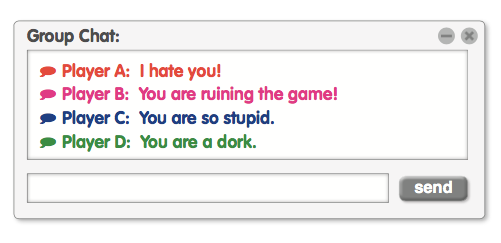3rd GRADE
WE ARE DIGITAL CITIZENS
LESSON 4: THE POWER OF WORDS
THE LESSON MISSION
We are going to watch a video about how words, whether typed or spoken, can impact how someone else feels. It is called, The Power of Words. Make sure you pay attention because I will be asking you questions about what you learned after the video. We will watch this together on over the projector in class, but I have embedded it here so you can easily watch it at home.
In your groups, read the following questions together. Each person in the group should discuss their answers and ideas with the other members of the group. Then, we will discuss it as a class.
SCENARIO OF THE TOPIC
A Scenario
Rani and Aruna love a website that has games and chatting for kids. Their parents let them play on the site. Lately, though, Rani and Aruna have been receiving mean messages on the site.
Chat Group Survey
Read the survey questions below about the online chat scenario. Answer the questions and click submit. We will talk about your responses as a class.
APPLYING THE TOPIC
Poll the Audience
Below you will see several polls. I will read each poll to the class and each student will vote. After the voting is complete, I will read the final results and we will talk about each poll.

Sometimes people post things online that are meant to be funny or sarcastic. Other times people post things that are just plain mean! There is a fine line between posting sarcastic comments and mean comments. This means that some sarcastic comments are so close to being mean comments that the reader can confuse the sarcastic comment for a mean one. Each poll below contains a statement posted on a text, chat group, or in social media. For each question, ask yourself this question:
Is this statement over the line!
|
|
|
|
|
|
|
|
|
|
|
|
EVALUATING STRATEGIES

Kids like to go online and use cell phones to email, chat, watch videos, send messages, play games, and do homework. But sometimes the language can get mean or scary. Messages that make people feel bad cross the line. Sometimes that meanness is unintentional, but when people use tools such as the Internet and cell phones to deliberately upset someone else over and over, that’s cyberbullying.
Strategies for Handling Cyberbullying
Cyberbullying is using technology tools such as the Internet and cell phones to deliberately upset someone else. If you feel that you are being cyberbullied, there are a few things you can do.

- Cooling down can be a good first step when you receive a mean message online. Taking a deep breath, counting backwards from 10, or pausing to think about what you will do next can give you time to think of the BEST way to handle the situation.
- Finding help or telling a trusted adult or a friend can be a good way to take action. You shouldn’t deal with the cyberbullying situation alone. The person you tell should be someone who wants to hear what you have to say, and will help you work on a solution. Adults can be especially good because they often have the power to influence the situation, or can give you advice about what to do.
- Ignoring the person who is cyberbullying you can be very effective. Those who bully often like attention.
- Whatever you do, remember to keep a copy of your communication with the individual who is cyberbullying you. If you delete the communication, there is no proof of how the bully treated you if you need to show it to a trusted adult.
MISSION ACCOMPLISHED
LESSON DEVELOPED USING:
What's Cyberbullying (3-5)
Common Sense Education. (2017). What's Cyberbullying (3-5). [online] Available at: https://www.commonsensemedia.org/educators/lesson/whats-cyberbullying-3-5 [Accessed 17 Sep. 2017].
What's Cyberbullying (3-5)
Common Sense Education. (2017). What's Cyberbullying (3-5). [online] Available at: https://www.commonsensemedia.org/educators/lesson/whats-cyberbullying-3-5 [Accessed 17 Sep. 2017].







